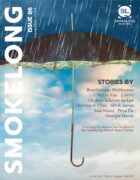This is an incredibly affecting piece, written in such a measured way. Can you share where it came from for you?
A couple of years ago, I took a workshop with the wonderful Dinty W. Moore. One of his prompts was to imagine you had only six months left to live; you’re not in pain or financial difficulty; what do you write about? To be honest, I didn’t really get it at the time. How do you imagine such an existential crisis? But now that I am going through health issues of my own, I see this prompt as a great steer, though I don’t think the message is to go dark or avoid dragons in your writing. I think the idea is—whatever and however it is you write—you need to care deeply about the subject matter. Anything less is a waste of time.
SmokeLong does not typically distinguish between fiction and nonfiction, with a focus on the quality of the work taking precedence over genre boundaries. As you present a very personal piece like this one to an audience, how do you feel about that approach?
I write both fiction and nonfiction. To me, they are very different animals. Fiction allows the author to take certain liberties with, say, the laws of physics or historical facts and the reader will be OK with that if they know this is fiction. Fiction also allows the author to profess, “This is not me!” Whereas when a piece is presented as nonfiction, none of that leeway exists. So there is an extra layer of fear for me whenever a nonfiction piece of mine gets published (in addition to the usual fear of being exposed as a terrible writer). Will people still like me? Will only the people who already know me get it? At the end of the day, my hope as a writer is that I’ve written a story that’s bigger than one individual’s experience because that is what the reader will respond to.
Someone who’s written a novel, according to your website, must find a kind of vacation in flash. Does writing flash feel lighter, or is it like poetry—my bailiwick—which feels weirdly onerous because it’s so condensed?
Writing flash is torturous for me! There’s no time for throat-clearing or backfill or navel-gazing, all of which a novel allows. And yet, within the space of a thousand words, you need to create stakes for your character(s) and allow them some sort of transformation. This is true for flash fiction and flash nonfiction. At the line level, I agree that flash is like poetry in that every word counts, but at the story level, it can’t be entirely mysterious.
On a personal level, what has literary art meant to you as you’ve navigated your real, lived experiences? How does it serve you?
My health situation has forced me to focus on writing about those topics and people and experiences that are important to me. I’ve chosen to do so largely in the form of creative nonfiction. It feels important, at this stage of my life, to be writing as truthfully and transparently as I can. And in a strangely woo-woo kind of way, I think writing is keeping me alive until I’ve said all I need and want to say.



 In September 2022 SmokeLong launched a workshop environment/community christened SmokeLong Fitness. This community workshop is happening right now on our dedicated workshop site. If you choose to join us, you will work in a small group of around 15-20 participants to give and receive feedback on flash narratives—one new writing task each week.
In September 2022 SmokeLong launched a workshop environment/community christened SmokeLong Fitness. This community workshop is happening right now on our dedicated workshop site. If you choose to join us, you will work in a small group of around 15-20 participants to give and receive feedback on flash narratives—one new writing task each week.